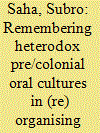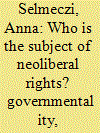| Srl | Item |
| 1 |
ID:
190732


|
|
|
|
|
| Summary/Abstract |
The paper explores what a (re)organisation of the existing histories of Bangla literature from Dalit literary perspectives can offer. Towards this end, it examines some of the early questions on the formation of literary standards and how that remained directly connected with caste hierarchies. It turns briefly towards late eighteenth and early nineteenth century Calcutta as a discursive-material site to explore symptomatically how such organising of dominant literary standards works its way through various forms of exclusion. When seen from the perspective of these exclusions, what does the question of Dalit literature offer in transforming the very idea of ‘literariness’? Also, what can the vernacular literatures offer in the reception of Dalit literatures in their multiplicity while resisting the tendencies of homogenising their volatility? Addressing such concerns, the paper turns towards a conceptualisation of Bangla Dalit literature as offering a poetics for multiple forms of dwelling.
|
|
|
|
|
|
|
|
|
|
|
|
|
|
|
|
| 2 |
ID:
139766


|
|
|
|
|
| Summary/Abstract |
Motivated by the litigious politics of the South African shack-dwellers’ movement, Abahlali baseMjondolo, this paper enquires into the knowledge dynamics implied by the governmentality literature’s take on the (neo)liberal deployment of (human) rights. It suggests that by implicitly constructing the freedom of codified rights as illusionary and opposed to the reality of neoliberal rationalities of government, this scholarship posits a cognitive hierarchy between agents of government and the governed, and thus reproduces the power dynamics that it seeks to criticise. Interweaving a presentation of Abahlali’s self-articulation as knowledgeable and rightful subjects with Jacques Rancière’s notion of ‘literariness’, the paper accounts for codified rights’ potential to enable the disruption of such dynamics, and traces the governmentality literature’s suspicion towards this potential back to its textual methodology.
|
|
|
|
|
|
|
|
|
|
|
|
|
|
|
|